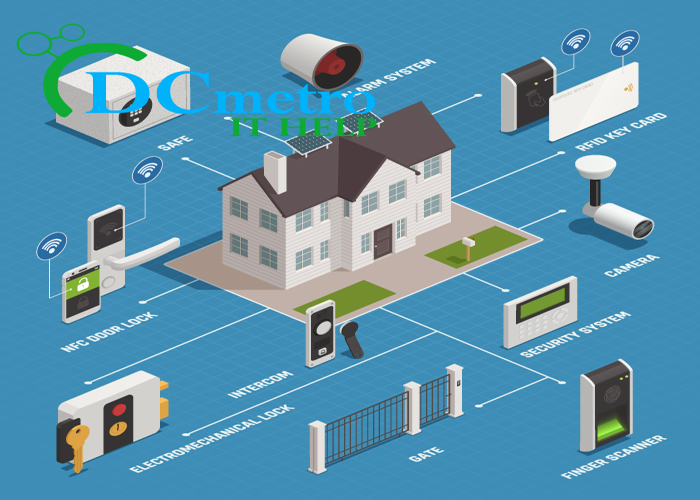In an increasingly interconnected world, security has become a top priority for individuals, businesses, and organizations. As traditional analog surveillance systems have limitations, there has been a significant shift towards IP cameras, also known as network cameras. IP cameras utilize the power of the internet and digital technology to provide advanced surveillance capabilities and revolutionize the way we monitor and secure our surroundings. Let’s explore the importance of IP cameras in modern security systems.
Contact us 202-810-7755 today to learn more about IP Camera. Please contact us to setup IP Camera for your business or if you have any questions or concerns.
DC Metro IT Help
High-Quality Video and Imaging: One of the key advantages of IP cameras is their ability to capture high-quality video and imaging. Unlike analog cameras, which often produce grainy and low-resolution footage, IP cameras offer superior image clarity, sharpness, and color accuracy. This level of detail is crucial for accurate identification, facial recognition, and evidence collection in security investigations. High-resolution video can be invaluable in preventing crime, identifying perpetrators, and ensuring the safety of individuals and assets.
Remote Access and Monitoring: IP cameras provide the convenience of remote access and monitoring, empowering users to view live or recorded footage from anywhere with an internet connection. Whether you’re at home, in the office, or on the go, you can monitor your premises in real-time using a computer, smartphone, or tablet. This remote accessibility enhances situational awareness, enabling prompt responses to security incidents or suspicious activities. Additionally, remote monitoring is particularly beneficial for businesses with multiple locations, allowing centralized control and surveillance management.
Scalability and Flexibility: IP cameras offer scalability and flexibility, making them suitable for installations of varying sizes and requirements. Unlike analog systems that often require extensive cabling and additional hardware for expansion, IP cameras can be easily added or relocated as needed. This scalability allows security systems to grow alongside businesses or adapt to changing surveillance needs. Furthermore, IP cameras support flexible configurations such as wireless connectivity, making them suitable for challenging or remote environments where traditional wiring may be impractical.
Intelligent Analytics and Integration: Another significant advantage of IP cameras is their ability to leverage intelligent analytics and integrate with other security systems. Advanced features such as motion detection, facial recognition, license plate recognition, and people counting can be integrated into IP cameras, enhancing their effectiveness in detecting and alerting for specific events or anomalies. Integration with access control systems, alarms, or video management software allows for a comprehensive security ecosystem, providing a holistic approach to threat prevention and response.
Cost Efficiency and Future-Proofing: While IP cameras may require a higher upfront investment compared to analog systems, they offer long-term cost efficiency and future-proofing. IP cameras utilize existing network infrastructure, eliminating the need for separate cabling and reducing installation costs. Additionally, IP cameras can transmit video and data over the internet, enabling centralized storage and reducing the need for on-site hardware. Furthermore, IP cameras benefit from regular software updates, ensuring compatibility with evolving security standards and technologies, thus safeguarding your investment and extending the lifespan of the surveillance system.
Enhanced Collaboration and Evidence Collection: IP cameras not only serve as a deterrent to potential threats but also facilitate enhanced collaboration and evidence collection. Recorded footage can be easily shared with law enforcement agencies or relevant stakeholders, aiding investigations and ensuring the accuracy of information. Additionally, IP cameras enable real-time collaboration among security teams, allowing for immediate coordination and response during critical incidents. This collaborative approach strengthens security measures and promotes a safer environment for everyone involved.
In conclusion, the importance of IP cameras in modern security systems cannot be understated. Their high-quality video capabilities, remote accessibility, scalability, intelligent analytics, integration options, cost efficiency, and collaborative features make them an essential tool for effective surveillance and threat prevention. As technology continues to advance, IP cameras will continue to play a pivotal role in safeguarding individuals, businesses, and organizations, creating a safer and more secure world.



Leave a Reply